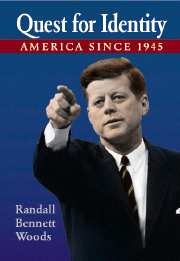Book contents
- Frontmatter
- Contents
- Preface
- 1 The Republic in Transition
- 2 The Origins of the Cold War
- 3 Staying the Course
- 4 Containing Communism and Managing the Military–Industrial Complex
- 5 Capitalism and Conformity
- 6 Liberalism Reborn
- 7 The Wages of Globalism
- 8 The Dividing of America
- 9 Realpolitik or Imperialism? Nixon, Kissinger, and American Foreign Policy
- 10 The Limits of Expediency
- 11 From Confidence to Anxiety
- 12 Governing in a Malaise
- 13 The Culture of Narcissism
- 14 In Search of Balance
- Index
7 - The Wages of Globalism
Foreign Affairs During the Kennedy–Johnson Era
Published online by Cambridge University Press: 05 June 2012
- Frontmatter
- Contents
- Preface
- 1 The Republic in Transition
- 2 The Origins of the Cold War
- 3 Staying the Course
- 4 Containing Communism and Managing the Military–Industrial Complex
- 5 Capitalism and Conformity
- 6 Liberalism Reborn
- 7 The Wages of Globalism
- 8 The Dividing of America
- 9 Realpolitik or Imperialism? Nixon, Kissinger, and American Foreign Policy
- 10 The Limits of Expediency
- 11 From Confidence to Anxiety
- 12 Governing in a Malaise
- 13 The Culture of Narcissism
- 14 In Search of Balance
- Index
Summary
The activist foreign policies of the post-1945 era that helped produce the war in Southeast Asia were a melding of the philosophies of conservative anticommunists, who defined national security in terms of bases and alliances and were basically xenophobic, and of liberal reformers, who were determined to safeguard the national interest by exporting democracy and facilitating overseas social and economic progress. Spearheading the first group were former isolationists such as Henry Luce who believed that if the United States could not hide from the world it must control it, rabid anticommunists who saw any expansion of Marxism-Leninism as a mortal threat to the United States, and elements of the American military and corporate establishments with a vested interest in the Cold War. Joining these realpolitikers, true believers, and political opportunists were the leading lights of the liberal community – Arthur Schlesinger, Dean Acheson, Joseph Rauh (head of the Americans for Democratic Action), and Hubert Humphrey. Products of World War II, these internationalists saw America's interests as being tied up with those of the other countries. They opposed communism because it constituted a totalitarian threat to cultural diversity, individual liberty, and self-determination. Amid the anxieties generated by the Cold War, anticommunism was a political necessity for liberals whose views on domestic issues made them ideologically suspect. Conservatives and their liberal adversaries may have differed as to their notions of the ideal America but not over whether America was ideal or whether it was duty bound to lead the “free world” into a new era of prosperity and stability.
- Type
- Chapter
- Information
- Quest for IdentityAmerica since 1945, pp. 208 - 247Publisher: Cambridge University PressPrint publication year: 2005



